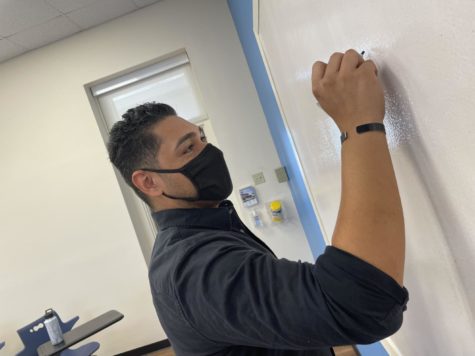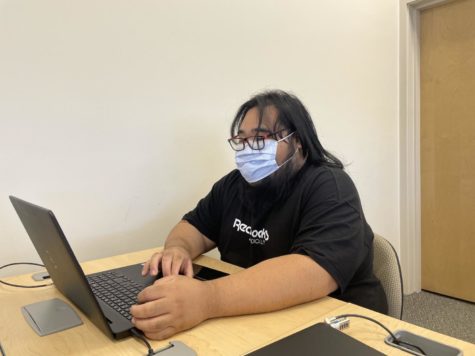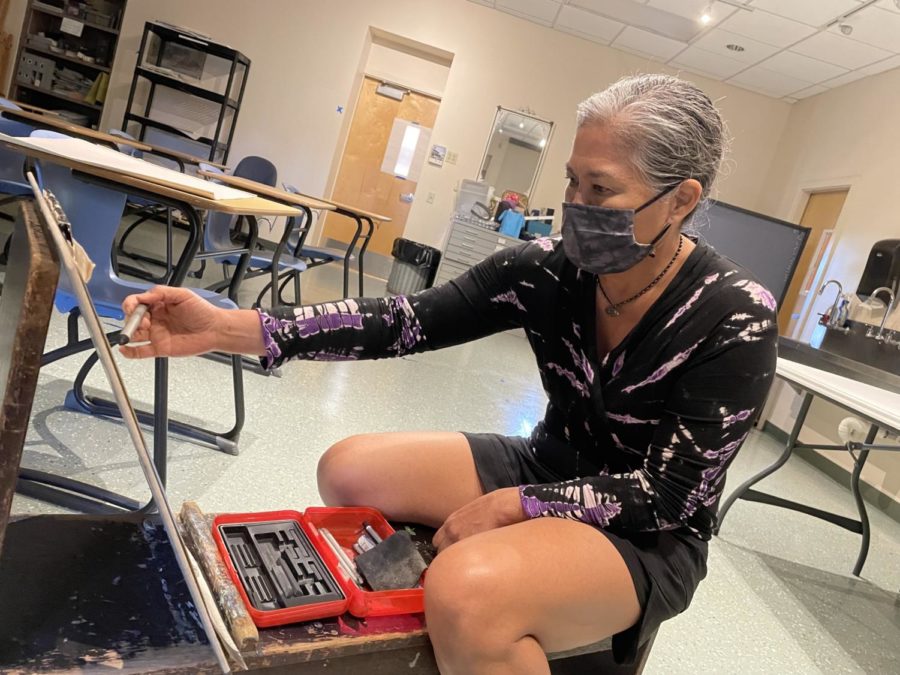Defying the Dominant Demographic: CUH Nontraditional Students Tell Their Story
CUH Nontraditional student Patty Moody works on her assignment for her drawing course.
The college student demographic is changing where students are not merely the typical high schooler fresh from graduation. Instead, a college student could be an individual who works a full-time job, is a parent, or already has a degree. Those who do not fit the cookie-cutter description of a traditional student are deemed nontraditional, and they are more common than one would expect. Nearly 40% of current undergraduates at American colleges are nontraditional.
Chaminade is no exception. Nontraditional students Patty Moody, Michael Trejo, and Teddy Barboza tell their stories.
Patty Moody, who is 57 years old, is currently between a junior and senior standing pursuing a bachelor’s degree in Fine Arts in Environment + Interior Design. Despite being a mother of two adult daughters, an owner of her own exporting business for 24 years and continuing, and having already attained a degree in Business and Marketing at the University of Oregon, Moody desired to pursue her long-awaited passion in art design.
“When I knew the girls were wanting to leave the nest and probably not come back,” Moody said, “I wanted to prepare and look into doing a switch into a passion that I’ve always had. … I really wanted to see the second half of my life go into a passion.”
Transitioning back into university in the Fall 2019 proved its challenges, yet Moody moved forward with a positive mindset. In everything that she does or learns, she faces it with vigor and excitement.
“Even in the classroom, I love it, because all these young people, it’s so fun! Everybody comes from different places and different ages. I learn from the young people,” she said.
Moody’s experience was seemingly positive from the start, yet not all nontraditional students are lucky enough to say the same.

Michael Trejo, a 31-year-old senior in the Criminal Justice program, holds a full-time job as a contractor while finishing his degree. Trejo was in the Marines before deciding to settle on Oahu. He commenced his education at Remington College in downtown Honolulu but was soon informed that the college would be discontinued. He then found himself at Chaminade University as it would accept his credits. Trejo felt a bit nervous. While Remington accommodated most nontraditional students, Chaminade was a more traditional school setting.
“In some way, shape, or form, I have faced some comments here and there like, ‘Oh, you’re old’ or ‘Oh what are you doing here?’ from the younger kids,” he said. “I take it with a grain of salt.”
Despite the comments, Trejo explained that he did not take them personally. Currently, he has established positive relationships with other students and finds himself in an older brother role to others in his major.
“People have gotten used to me,” Trejo said. “I’m constantly finding myself giving my old man advice to a lot of classmates or friends.”
Some nontraditional students prefer to keep to themselves with the intent of graduating as soon as possible.

Teddy Barboza is a junior working toward a degree in Community Public Health, emphasizing nonprofit administration. The 32-year-old Oahu native first worked after high school graduation before joining the Navy. After working as a corpsman for four years, he commenced his education at El Camino College in Torrance, California.
Due to the Covid-19 pandemic, Barboza decided that it would be best to be closer to his family and friends. He transferred to Chaminade University the spring semester of 2021? in hopes of finishing his bachelor’s degree and moving on to a master’s in Business Administration. Barboza understood that Hawaii has a high cost of living and decided to return and continue his education to find a secure occupation. He is taking his education quite seriously by taking seven courses, or 19 credit hours, per semester and focusing on graduating.
“I opted not to work until I finish,” Barboza said. “So, my main focus is to finish as soon as possible.”
When asked about what he would say to other potential nontraditional students, he said, “Tell them, ‘No shame. You’re doing this for yourself to better your chances of whatever you’re trying to accomplish. Whether you’re trying to make more money or if you have to change your career.’ I don’t think there’s anything to be ashamed of. If you have the opportunity to go back to school, I would.’”
